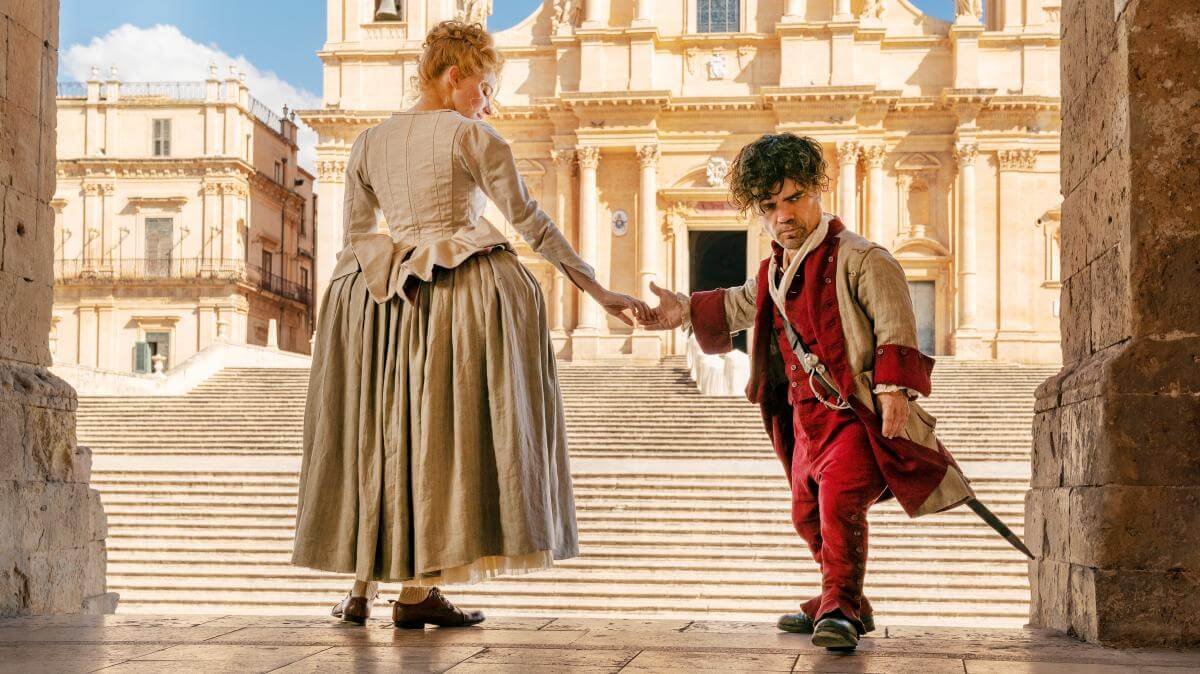Directed by: Joe Wright
Written by: Erica Schmidt, based on Edmond Rostand’s play
Starring: Peter Dinklage, Haley Bennett, Kelvin Harrison Jr., and Ben Mendelsohn
Runtime: 124 minutes
‘Cyrano’ has no self-doubt
“I like to think that (this movie) allows (the “Cyrano” story) to speak more universally, and not just specifically to someone my size or somebody who is differently-abled. We all have that sort of insecurity when it comes to the person that we are.” - Peter Dinklage, Dec. 26, 2021 “CBS Sunday Morning” interview with Lesley Stahl
Edmond Rostand’s 1897 seminal play “Cyrano de Bergerac” – set in the 17th century - is 125 years old, but the title character’s internal struggle has existed as long as humans have stood upright.
Self-doubt.
Based on a real-life Cyrano, Rostand’s creation is about one man’s apprehension to pursue love due to his insecurities, ones based solely on his looks. Cyrano believes that he isn’t worthy of another’s love, anyone’s love, due to his unusually lengthy nose.
Theatrical, television, and film artists have retold this classic for decades, perhaps because Cyrano’s woes resonate with our misgivings. Granted, barely anyone walking and talking on Planet Earth has a Cyrano-sized nose. Still, we’re all humans, and self-criticism is a frank, unfortunate, and familiar art form. We can find anything to criticize ourselves.
In the 21st-century social media age, perhaps our self-deprecating struggles are noticeably more pronounced than in tighter 17th and 19th-century community circles.
Well, in 2018, Erica Schmidt – Peter Dinklage’s wife - wrote and directed a musical version of the seminal story starring Peter and Haley Bennett. Director Joe Wright (“Pride & Prejudice” (2005), “Darkest Hour” (2017)) saw the play in Connecticut and asked Erica to write a screenplay and Peter and Haley to star in his film adaptation.
This movie differs from “Cyrano de Bergerac” (1950), starring Jose Ferrer, who won the 1951 Best Actor Oscar for his swashbuckling (and tragic) take on the character, and “Roxanne” (1987) with Steve Martin’s modern-day interpretation as Charlie “C. D.” Bales, a small-town fire chief. “Cyrano de Bergerac” (1990) showcases Gerard Depardieu, and he and the cast appropriately speak in French. The 1990 film garnered a Best Costume Design Oscar and four other Academy Award nominations, including Best Actor (for Depardieu) and Best Foreign Language Film. Sadly, this critic has yet to see the last-mentioned movie.
In this 2021 account, Wright replaces our hero’s nose-anxiety with height challenges. Although this particular self-criticism speaks to new visual reactions, Cyrano’s (Dinklage) vulnerable churn remains virtually identical to past performances….that this critic has seen.
Cyrano - in love with his longtime friend, Roxanne (Bennett), but afraid to express it – discovers that she has a case of “le coup de foudre” with a handsome new soldier, Christian (Kelvin Harrison Jr.). Rather than Cyrano professing his deep affections for Roxanne, he helps Christian win her over by writing love letters in the young legionnaire’s name. You see, Christian doesn’t have the knack for the written or spoken word.
Since this retelling doesn’t sway too differently from the basic story, why see this “Cyrano”?
A few reasons.
Dinklage and Bennett share intriguing, enjoyable chemistry and are a lovely pair. Wright captures several close-ups of his two main actors during the most critical times, such as when Roxanne admits her adoration for Christian instead of her beloved friend. Throughout the film, Bennett’s Roxanne looks angelic with beautiful, porcelain skin and a trusting presence, while she’s plainly unaware that her declarations for another inflict painful, damaging blows to her lovesick friend. Meanwhile, we see the color and life drain from Cyrano’s face upon learning those fateful, aching words.
However, Dinklage’s Cyrano capably seizes chances for swordplay and clashes during the first act on a theatre stage and later in the streets. Still, Ferrer had more opportunities to wield Cyrano’s steel.
Also, this movie maintains its harmonious roots from Schmidt’s musical, which offers a refreshing slant to the lavish production, and Dinklage and Bennett are competent crooners. Their ranges aren’t operatic, but Dinklage and Bennett’s rendition of “Overcome” during the famous balcony scene is beyond convincing. In fact, my glasses fogged due to streams of tears as Cyrano and Roxanne asserted their loving testimonies and Aaron and Bryce Dessner plucked an array of string instruments during post-production (or in the background somewhere).
Yes, the moment overcame this critic as well!
Admittedly, I approached this film with curiosity, sometimes partaking in a study of compare and contrast, wondering about Wright’s angle towards the source material. Still, Dinklage, Bennett, and Harrison Jr. (to a lesser degree) – at times - shook me out of my quasi-scientific study and into unadulterated periods of astonishment, especially since Schmidt captures layered nuance with both playful banter and crucial, solemn discourse between Cyrano and Roxanne.
In this case, the love story rests on a stunning foundation, namely Sicily. Wright, the cast, and crew filmed on location on the dazzling island, and our leads and seemingly hundreds of extras stroll, frolic, and fight on a bedrock of history. Apparently, archeologists discovered human settlements dating back 14,000 years on the isle, a place that hosted wars and various kingdoms throughout the centuries. Of course, it feels apropos that Wright filmed this historic (and historical) literary account on such a recognized locale. No doubt, this film doesn’t look or feel manufactured on a Hollywood sound stage, and Wright takes full advantage of his topographical and architectural riches, including duels and dances on ancient boulevards and war movements at the foot of Mount Etna.
(In fact, Etna erupted during the filming! What?)
While Wright offers grounded realism for our 17th-century players, the audience does lose some polish that a studio stage would provide. A shine, actually, because some specific indoor scenes and outdoor shots at night appear dim on the big screen. It feels like cinematographer Seamus McGarvey – who collaborated with Wright on “Atonement” (2007), “Anna Karenina” (2012), and “Pan” (2015) – uses candlelight inside and limited glows outside. Simply put, the film operates in shadows at times. It’s distracting when we need more precise, brighter views of clanging swords or De Guiche (Ben Mendelsohn) – the movie’s villain – delivering some selfish, icky lines to force Roxanne’s hand in marriage.
A couple of other issues light up.
Mendelsohn – who played one of the most depraved antagonists in recent memory as Uncle Pope in “Animal Kingdom” (2010) – has lapped up villainous roles for years, but he isn’t quite menacing enough here. Yes, De Guiche delivers some devastating edicts but only through their ultimate outcomes, not in the heat of the moments. A few subtle, sinister twirls of De Guiche’s mustache would’ve gone a long way, but unfortunately, we don’t get them.
Speaking of twirls, the film could’ve also placed de Bergerac in more spots of whimsy or joy. The screenplay plays it straight as Cyrano marches down the inevitable enabling path towards Christian and Roxanne. However, as a principal mentor in a French regiment, one would think that Cyrano would frequently lead men in boisterous group exchanges, battles of wit, and laughs. Such happenings would help bolster our on-screen hero. However, besides a very public spanking of an oafish jerk in the first-act theatre scene and then, an entanglement of blades on the ancient streets, de Bergerac often converses in tighter quarters, without public eyes to marvel at his humor, wisdom, and athletic showmanship. In most cases, his magnanimous talents are primarily on display only for individual, intimate conversations with his trusty friend Le Bret (Bashir Salahuddin), Christian, or Roxanne.
The result is a serious, subdued, and pained Cyrano, and you might wish that our champion have grander, more celebrated collaborations, cherished fellowships, and some chuckles during the second or third acts.
Overall, this film holds tightly onto more sober tones, but it isn’t without some whimsy. Still, you won’t find anyone utter, “Because I was afraid of worms, Roxanne! Worms!”
Hey, that’s alright.
“Cyrano” (2021) is a fine achievement. Dinklage and Bennett confidently and successfully step into these unforgettable characters with Oscar-nominated costumes and a flat-out spectacular backdrop, and Wright, Schmidt, Harrison Jr., the Dessners, the crew, the rest of the cast, and the leads will probably trigger tears that could fall onto your popcorn. Bring tissues to catch them because we may cry for Cyrano and maybe a little for ourselves too. Not many of us are entirely free of insecurity.
Jeff’s ranking
3/4 stars















